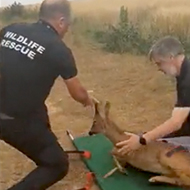
The roe deer had been chased by a dog.
Volunteer crew members at the Royal National Lifeboat Institution (RNLI) answered an unusual rescue call when a deer was found swimming out to sea.
The deer, an adult roe, was seen in the water near Holywell, East Sussex after being chased by a dog.
An RNLI lifeboat crew was launched from Eastbourne to herd the deer onto the beach, where a team made up of the RNLI, East Sussex Wildlife Rescue and Ambulance Service (WRAS), HM Coastguard and East Sussex Fire and Rescue was positioned to catch the animal.
“After seeing the deer struggle to get out of the water and lay down exhausted, we were surprised at how lively it was when we made our first approach,” said Trevor Weeks MBE, operations director for East Sussex WRAS.
“It shot off at high speed along the beach in the direction of Eastbourne Pier, jumping over groynes and on several occasions swimming out to sea.
“The RNLI were able to encourage the deer ashore near the Lifeboat Museum where it went to ground, hiding in some bushes.”
Volunteer from the RNLI, Jaiden Perna, helped to keep the deer still to get in under control and calm, and later on, the deer was released onto the South Downs National Park.
Image (C) RNLI and East Sussex WRAS



 Zoetis has launched a new survey to identify management techniques for Equine Herpes Virus (EHV).
Zoetis has launched a new survey to identify management techniques for Equine Herpes Virus (EHV).